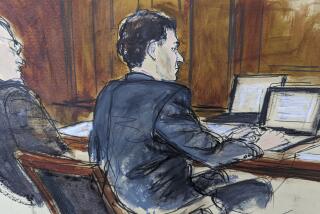Trial of Former Wall Street Journal Reporter, 2 Others : Didn’t Believe Plan Was Illegal, Ex-Broker Says
NEW YORK — Ex-stockbroker Peter N. Brant, the government’s key witness in the stock-fraud trial of former Wall Street Journal reporter R. Foster Winans and two other men, testified Monday that he had no inkling that there was anything illegal about their scheme to profit from advance notice of Journal articles until it was uncovered.
Brant also explained that he resisted confessing his role in the arrangement after the Securities and Exchange Commission opened an investigation because he feared that the probe might uncover “improprieties” in the trading account of one of the alleged partners in the scheme, New York lawyer David W. C. Clark.
Clark, a former client of Brant’s whom the SEC has charged with civil fraud in the case, has not been indicted but remains under criminal investigation.
The “improprieties,” Brant acknowledged, apparently involved Clark’s accusation that the broker had embezzled as much as $2 million from the account, which Brant denies.
In his third day of testimony and second under cross-examination in federal court here, Brant said senior executives of Kidder, Peabody & Co., where he was a top broker, were unsure whether trading on Winans’ tips was illegal, as the government contends.
Around Nov. 17, 1983, Brant said, he was confronted by Kidder General Counsel Robert Krantz, who told him the firm was concerned about the statistical correlation between Clark’s trades and the Journal articles. Krantz said he had asked outside counsel to prepare a memo on the legality of such trading, but Brant said Krantz never told him what the memo concluded.
“I thought it might be an unethical practice but not illegal,” Brant said.
Winans is on trial with his roommate, David Carpenter, and Kenneth P. Felis, Brant’s college roommate and former co-worker at Kidder, Peabody. They are accused of profiting from trades made on advance knowledge of articles that Winans was writing for the Journal’s influential Heard on the Street column, which often inspires movement in the prices of the stocks that it mentions. The allegedly illicit trading took place between October, 1983, and last March, when the trading was discovered and Winans was fired.
Brant has pleaded guilty to three conspiracy and fraud counts but has not yet been sentenced.
Brant also testified Monday that he and Clark made plans to flee to Brazil last March after the SEC’s investigation began. They went as far as to obtain visas and airline tickets but, for an unexplained reason, chose not to follow through.
According to Brant, early in 1984, Clark, who was becoming becoming financially strapped and emotionally depressed, offered him the opportunity to take part in a cocaine deal to raise cash. Brant said he declined.
Much of Brant’s testimony Monday, delivered in his customary morose monotone, covered Felis’ role. Felis’ attorney, E. Michael Bradley, attempted to show through questioning that Felis knew scarcely anything about the Winans-inspired trading, was never the direct recipient of Winans’ leaks and had little else to do with the arrangement.
Brant acknowledged that he did all the pertinent trading for the Kidder account that he and Felis maintained surreptitiously under Felis’ name.
And he said it was “conceivable” that the stratagems that the group used to try to throw government investigators and Kidder executives off the scent of the scheme were his own ideas.
These included telling Kidder officials that Felis was simply “mimicking” trades initiated by Clark for his own account, and inscribing on a check that Felis made out to Carpenter as payment for Winans’ leaks with the word drapes so that the payment could be defended as a payment for Carpenter’s interior decorating services.
Brant said it was his idea to move the trading to a secret Swiss account after Kidder officials told them to cease. But it was Felis who made the trip to Switzerland to open the account, he said.
More to Read
Sign up for Essential California
The most important California stories and recommendations in your inbox every morning.
You may occasionally receive promotional content from the Los Angeles Times.










